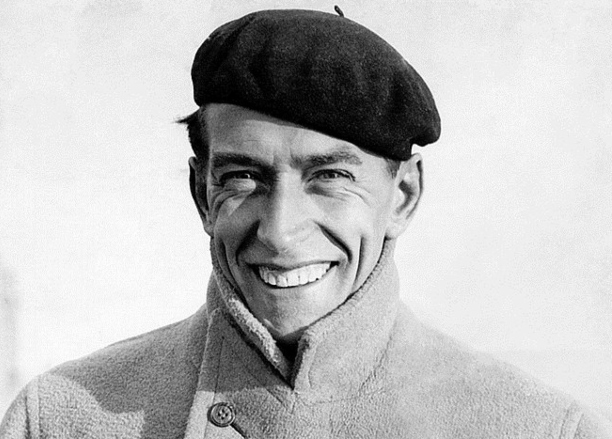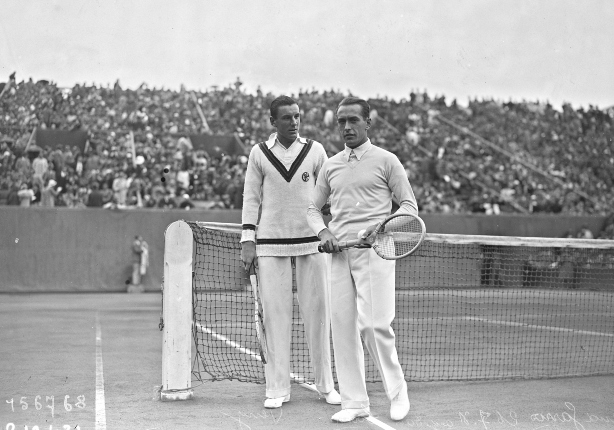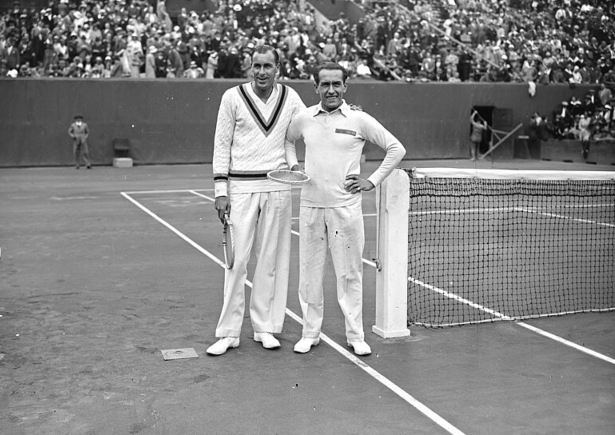Photo credit: Agence Roi/Wikimedia Commons
When you think of Wimbledon you think of some of the greatest matches ever played.
You think of classic contests like Rafael Nadal out-dueling Roger Federer in arguably the greatest match ever played in 2008. You remember Bjorn Borg overcoming archrival John McEnroe, 8-6 in the fifth set of the 1980 final.
You reflect on Borg defeating good friend Vitas Gerulaitis in the 1977 semifinals.
You recall Martina Navratilova topping Chrissie Evert in the 1978 final, Evert outlasting Evonne Goolagong in the 1976 final.
You think of Venus Williams saving championship point in defeating Lindsay Davenport 4–6, 7–6 (7–4), 9–7 in an absolutely thrilling 2005 final.
Of course, most fans will think of Novak Djokovic saving championship points to stun Roger Federer in that epic 2019 final decided in the fifth-set match tiebreaker.
Watching Wimbledon for decades, I have often thought of what major tennis tournaments I would have loved to have seen if I could go back in a Time Machine.
There are so many choices of course but if you gave me access to a Time Machine, I would choose to travel all the way back to the 1927 Wimbledon.
There were so many legendary players in that tournament. You had Bill Tilden, Rene Lacoste, aka The Crocodile, Jean Borotra and last but not least, The Magician Henri Cochet.
I could also witness Helen Wills’ first Wimbledon title out of the eight she eventually would win.
With all the great matches in Wimbledon history, I am not sure if any player ever had the series of unbelievable almost surreal matches that Henri Cochet had at Wimbledon in 1927.
Cochet was a tennis player who has fascinated me for years. He was not a particularly tall man at only 5’6” tall. However, this Frenchman, born in Villeurbanne, was considered a tennis genius. Many greats like Bill Tilden thought at his best, Cochet was perhaps the greatest ever.
Cochet won 90 tournaments in his career including seven Grand Slam singles championships. He also won the World Covered Court twice on a wood surface when it was considered a major. The same can be said when he won the World Hard Court in 1922. So you can argue he actually won the equivalent of 10 majors.
He never played the Australian championships. Many players did not because the boat trip would take too long.
In a poll by Martini and Rossi in late 1969 Cochet was named the seventh greatest player in men’s tennis history.
In looking at some of his won-lost records and his feats on the court, you could even argue that Cochet was as great as any player that ever lived. Great tennis writers like Allison Danzig ranked him as high as second all-time. Harry Hopman the great Australian tennis coach ranked Cochet at No. 5 and Lance Tingay ranked Cochet at No. 7.

Big Bill Tilden was ranked No. 1 on the Martini and Rossi poll and by Danzig, Hopman and Tingay. For years, Hall of Famer Bud Collins ranked Tilden as No. 1 GOAT—until Bud saw prime Roger Federer and eventually put Federer ahead of Tilden.
So, when Cochet met Tilden in the semifinals of the 1927 Wimbledon, it was truly a battle for the ages.
Tilden had a bad knee injury in 1926 playing a match against Rene Lacoste. It was so bad his knee clicked when he ran. A few years prior to that he had part of his thumb amputated because of an infection.
Tilden adjusted his backhand grip to deal with the thumb but I mention this to point out that perhaps Tilden was no longer the invincible peak level Tilden. He was still great of course. For example, in 1930, only three years later, Tilden won Wimbledon and 18 other tournaments with a 120-6 record.
That year of the 1927 Wimbledon, Tilden had a 100-5 record. Clearly Tilden was still immensely strong.
This was the beginning of the French Domination of Tennis and the Davis Cup.
They were called the Four Musketeers. The team consisted of Henri Cochet of course, Rene Lacoste, nicknamed the Crocodile. Yes, Lacoste is the guy with the Polo shirts that you see Novak Djokovic wearing today. The other two were Jean Borotra and Jacque Brungnon. All of them were excellent tennis players although Brungnon was primarily known for his doubles skills.
The playing styles of the three main singles players, Cochet, Lacoste and Borotra differed widely.
Lacoste was the ultimate baseliner, very scientific and logical. He took notes in depth of every player which was unusual in those days. He started playing tennis relatively late in life for a World Class Pro at I believe the age of 15. His hero was Bill Tilden, who he would later defeat in several huge finals like the 1927 US Nationals. Although Lacoste had a good volley, his main modus operandi was his seemingly errorless control during baseline play. He had superb groundstrokes including a backhand thought by many to be the best in the game. He had excellent speed. His lobbing was immaculate.
Borotra was the dashing net rusher. According to Ellsworth Vines, Borotra was an apostle of the serve and volley and moved better at the net than anyone he had ever seen. Vines wrote that Borotra was even quicker than Fred Perry! Perry was long regarded as one of the fastest players ever so that was high praise indeed.
All these players were extremely talented and gifted, yet Cochet was considered to be the most talented of them all.
Unfortunately, we can’t find any video of Cochet for long periods during his peak period although we do have some video of him losing to Ellsworth Vines in the finals of the US Nationals now known as the US Open.
Cochet was known for his nonchalant way of playing. Apparently, he played in a way that made his shot making seemingly effortless. From the descriptions of his play, his footwork was very smooth and flowing. He often went into no man’s land where he would half volley shots with apparent nonchalant ease. They say he rarely practiced and relied on his great talent to win.
Hall of Fame writer and former US Nationals semifinalist Gene Scott wrote of Cochet “Henri Cochet was the smallest of the celebrated French Musketeers (at 5’6” 145 pounds), but his touch, style and mastery of every stroke in the game, including the esoteric half-volley and angle volley propelled him to the World No. 1 ranking from 1928-1931.”
Cochet’s serve was only adequate but his net play was brilliant.
It wasn’t an accident that one of Cochet’s nicknames was The Magician. He seemed to be able to produce stunning angles from his half volleys that seemed impossible. Some have written that he could hit groundstrokes virtually parallel to the net.
Despite Cochet’s small stature, his battle with Tilden in the 1927 Wimbledon semifinals was a Battle of the Titans! I suppose in this case it was a Tiny Titan versus a Big Titan with Tilden at 6’2” tall. Cochet reached the semifinals by recovering from a two-set deficit to defeat Frank Hunter 3-6 3-6 6-2 6-2 6-3. Tilden lost only one set in the tournament, to Brugnon in the quarterfinals to reach the semis.
Tilden apparently saw how Cochet defeated Hunter and hoped to overpower Cochet in order to put him away quickly. Things were running smoothly on all cylinders for almost 3 sets. Tilden led Cochet 6-2 6-4 5-1 and 15 all in the third with Cochet serving. The match looked like it was over. It was not! Cochet won 17 consecutive points to get to 5 all and 30-0 before Tilden won a point!
Cochet won the third set 7-5 and the fourth set 6-4 to tie the match. Tilden rallied to lead 3-2 with his serve to come. There was still a chance for Tilden to win despite squandering a huge lead. The chance for Tilden to win was simply an illusion. Cochet, the younger player by about eight years won the last four games and completed the comeback with a victory in the fifth set 6-3.
This was one of the most remarkable comebacks in tennis history. Cochet did not just defeat an ordinary player, he defeated Bill Tilden, who even at that time was thought of to be possibly the GOAT in tennis.
Henri Cochet reached the Wimbledon final to find his countryman and Davis Cup teammate Jean Borotra waiting.
Typically now of Cochet, he lost the first two sets 6-4 6-4. At this point, perhaps Cochet thought that he had Borotra exactly where he wanted him.
Of course, Cochet won the next two sets 6-3 6-4. Nevertheless, Borotra persevered and led 5-2 in the fifth. Cochet went about his business, surviving 6 match points including one that some considered a double hit which at that time the point would have been awarded to Borotra.
Here was the situation that was so controversial, Borotra was leading 5-3 in the fifth set 40-30 and serving. Borotra served and came in. Cochet hit a return down the middle and also came in. So at this crucial point in the final of the 1927 Wimbledon, two of the finest volleyers in the world were facing each other at the net! There was a lightning exchange of volleys and the point ended when apparently Cochet had a double hit according to some.
In those days if you had a double hit you lost the point. In this case if it was not a double hit then Cochet’s volley would be a winner. Luckily for Cochet the umpire did not think it was a double hit and it was a winner.
Cochet indicated later that it wasn’t a double hit. Play continued as Cochet survived another match point.
Cochet survived yet again another match point that was won on a net cord!
Of course, the inevitable happened with Cochet winning Wimbledon in 1927 by a score of 7-5 in the fifth set.
The Cochet versus Tilden match in 1927 has often been called one of the greatest matches of all time and deservedly so. But I do think that possibly the final against Borotra very well could be also. Perhaps the final was the superior match overall.
Let’s not forget that Cochet fought off six match points in the final. He did not fight off any match points against Tilden in the semifinals. Borotra was still battling and very competitive in the fifth set of the final, while from all accounts Tilden was exhausted and done for in the final set in the semifinal match.

It seems very clear to me that the final of the 1927 Wimbledon was at least more thrilling and is very underrated.
The big mystery to all who witnessed this was whether Tilden’s loss was because his game fell apart or whether Cochet raised his game to defeat Tilden. Many thought it wasn’t due to Cochet. My guess is that it was a combination of both but more credit given to Cochet. Cochet recovered from possible defeats like this too often for it to be just a fluke.
Cochet had an uncanny ability to raise his game when it seemed like he was inevitably going to lose. I suppose many of the greats have that ability or else they wouldn’t be considered great but it seems Cochet was unique even in this aspect of tennis. Cochet eventually earned another nickname of Five Set Cochet for his ability to come back when in desperate trouble.
The 1927 Wimbledon final was overshadowed by Tilden’s collapse in a match people thought he had all but won. Tilden was a larger-than-life figure. He was arguably as famous as any athlete in the world.
Considering what happened at Wimbledon in 1927 for Cochet I wonder if his nickname of The Magician wasn’t only because of his tennis skills. Maybe some magical forces helped Cochet win that tournament. What happened at Wimbledon in 1927 seemed so strange that it almost seems magic is the only explanation! Perhaps Cochet waved his magic wand and a tennis miracle happened. I guess in this case his magic racquet was his wand.
Cochet was capable of just unbelievable matches. There was a Davis Cup match in 1929 in which he destroyed Tilden in straight sets losing only 6 games by a score of 6-3 6-1 6-2. Tilden was rarely if ever beaten so badly. Tilden in this match had only 57 points in the three sets as opposed to Cochet’s 86. Cochet had only one double fault to Tilden’s three although Tilden did have three aces to Cochet’s none. I believe the general consensus of this match was that Tilden did not play badly but Cochet was so brilliant Tilden was not able to touch his play.
Cochet went on to become the world No. 1 for a number of years. Some have Cochet as No. 1 from 1928 to 1931. The rankings were different in those days. Essentially, at that time the rankings were polls of tennis experts who had an opinion about who was the best that year. Some writers would just pick the Wimbledon champion as number one for the year, which may or may not be correct. There was really no standard of how to rank a player for that year.
I would have probably voted for Bill Tilden as the No. 1 player in 1930 instead of Cochet. Tilden won the championships of five nations which were Italy, Austria, Germany, the Netherlands and Wimbledon. Tilden was 120-6 for the year, winning 18 tournaments. That year in 1930 for Tilden would be a good career for a lot of players.
Cochet won the French Championship over Tilden in the final in 1930 in 4 sets by a score of 3-6 8-6 6-3 6-1. Descriptions of Henri Cochet’s play against Tilden was that he mesmerized Tilden with his great play in the French final.
Later Cochet played the 1930 Wimbledon and lost in the quarterfinals to Wilmer Allison in straight sets. So, in the two majors, Cochet won the French and lost in the quarters of Wimbledon. Tilden by comparison, lost to Cochet in the finals of the French and won Wimbledon. By today’s standards and frankly I think even by the standards of 1930 if they were logical, Tilden had a superior result if we look at both the French and Wimbledon that year.
How Cochet was ranked over Tilden in 1930 is beyond me. Of course they didn’t have access to the information we have today. I think quite often in those days tennis experts ranked them on the style of play and their opinions of how strong the player was.
I believe the big point was that Cochet defeated Tilden in the one major that Cochet won for the year. This proved again that he was superior to Tilden in the minds of many experts at the time. So, while Tilden was fantastic for the year and had the superior year by record, Cochet did beat him in a major final. So, in the minds of many experts, Cochet was still the better player. I suppose it makes some sense but, in this case, I think it was the wrong conclusion.
Some records have Cochet only playing 18 matches going 15-3 in 1930 despite winning the French. I also have records that have Cochet playing only 23 matches in 1931 winning 21.
I understand why Cochet didn’t play much in 1931. Apparently, he was ill with the flu and malaria.
Perhaps I am judging the rankings of those days too much on today’s standards. Still I don’t see Cochet ranked over Tilden in 1930 when Tilden won Wimbledon and was in the finals of the French, losing only to Cochet. As I wrote earlier, Tilden won 18 tournaments that year including the championships of 5 countries with a 120-6 record. I don’t see Cochet’s record in 1930 coming close to that even if we discovered he played far more.
Still Cochet went on to be an all-time great. Cochet was 65-7 in 1927 and the next year he won 79 and lost only 2. These are tremendous records that you might expect an all-time great to have.
Even when he was past his peak, Cochet still was good enough to defeat Don Budge at his peak by a score of 6-3 5-7 7-5 in 1939 on a clay court. Cochet was to turn 38 in December. Budge was 24 that year.
Cochet was a brilliant and occasionally erratic genius of the game. Cochet was one of the most dazzling players in the history of tennis.
But in some ways that is perhaps more important, he thrilled fans and other players with the dynamic style of his play. Cochet, Lacoste, Borotra and Brugnon symbolized the romanticism of that particular tennis era.
The Four Musketeers of France changed tennis and enriched us with their great matches.
https://www.gettyimages.ca/detail/video/here-is-sensational-play-for-davis-cup-cochet-of-france-news-footage/598577400?adppopup=true
Here’s Cochet playing Tilden in the 1930 French championship.
The match starts at the 1 minute and 3 second mark. The headline is inaccurate. Tilden did not lose for the fourth straight year.
https://www.gettyimages.ca/detail/video/helens-champ-again-paris-france-an-all-american-final-news-footage/595945904?adppopup=true
Raymond Lee is a Tennis Now contributing writer, tennis historian and avid tennis player who lives in New York. He has written about tennis for more than three decades serving as a contributing writer for Tennis Week Magazine and TennisWeek.com. Raymond Lee joined the Tennis Now staff in 2010.
Check out Raymond Lee's Articles: The Greatest Over Age 30 Players of All Time, Star Turns: Top Tournament Performances in Tennis History, One for One: Who is the GOAT for One Match? Celebrating 50th Anniversary of John Newcombe's 1973 US Open Win, Why Novak Djokovic Can Win 30 Slams and Holy Grail: Why Winning the Calendar Grand Slam is Toughest Task in Sport and The Greatest Men Clay-Court Champions Of All Time
